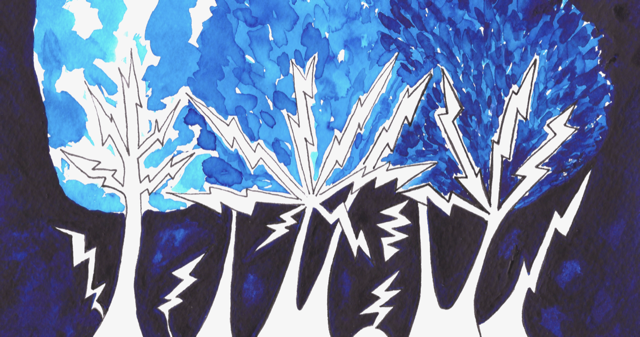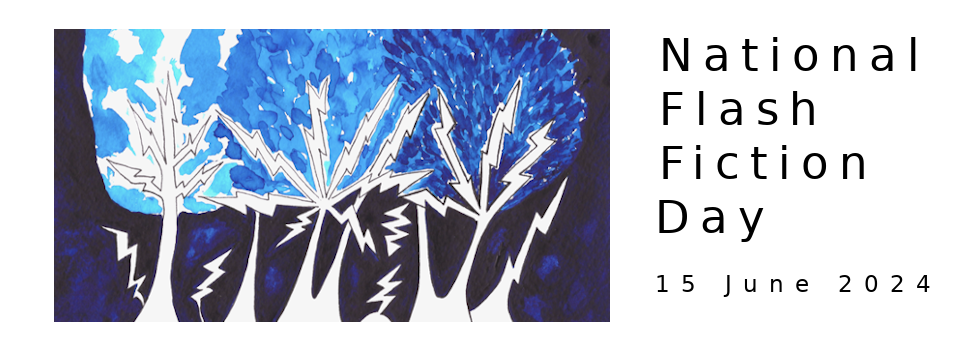Welcome to the first in a series of interviews with this year's National Flash Fiction Day Anthology editors and Microfiction Competition judges! This week, Diane Simmons chats with one of this year's anthology editors, National Flash Fiction Day's own Santino Prinzi, about his latest collection, his history with National Flash Fiction Day, and what he loves to discover in a submission queue....
*
Diane: I very much enjoyed your flash collection This Alone Could Save Us which was published by Ad Hoc Fiction in 2020. Can you tell us a little about the collection?
Santino: I’m very glad to hear you enjoyed the collection! This Alone Could Save Us focuses on the theme of change, how well we do – or don’t – handle change, and how our expectations and perceptions of others don’t always match up with the reality.
The following quotation from Mary Shelley was at the back of my mind when I was compiling stories for this collection:
‘Nothing is so painful to the human mind as a great and sudden change. The sun might shine, or the clouds might lour: but nothing could appear to me as it had done the day before.’
The stories are very varied and may not seem to fit together necessarily, but the way an unexpected event – minor or major – can suddenly and irreparably shift reality is explored in each of these stories. I also enjoyed exploring telling stories with a surreal edge, and I think this was something I was conscious of when writing some of these flashes. Flash fiction really enables authors to be playful and explore the weird and wonderful.
Diane: You have previously published two collections of flash fiction: Dots and Other Flashes of Perception (The Nottingham Review Press, 2016) and There’s Something Macrocosmic About All of This (V. Press, 2018). How has the process of publishing your new collection differed because of coronavirus restrictions?
Santino: Personally, I don’t feel the process of publishing my collection has been very different. If I remember correctly – which I may not, because trying to pinpoint exactly what has happened throughout 2020 feels like wading through thick fog – the collection had pretty much been finalised before the first UK lockdown, bar perhaps a few odds and ends.
The key difference for me has been around the physical launch and promotion of the collection itself. I feel uneasy marketing a book called This Alone Could Save Us during a global pandemic, as if I’m claiming you can shelve all your worries because this book is here to fix everything. I even considered changing the title at one point, but I kept it because stories widely do have the power to save us. For me, personally, retreating into various forms of narrative – books, films, videogames, etc. – has been how I’ve managed to navigate these unsettling times. I also like the title a lot.
We had planned to launch the collection at the Flash Fiction Festival, an annual festival held in Bristol where flash fiction writers and teachers from all over the globe descend for a weekend of words, workshops, readings, wine, and karaoke. Obviously this couldn’t happen, but we instead published and launched the anthology a few weeks later at the beginning of August.
The launch via Zoom was truly wonderful and a highlight of 2020 for me. While it would’ve been great to launch the collection with an in-person event, an online event enables so much flexibility. People from all over the world were able to come to the launch, many who may not have been able to come otherwise, and I was able to have a number of guest authors to help me celebrate the launch by reading their own stories too.
And, of course, the book is out there in the world finding its way to readers, and being able to share the stories I wanted to share with the readers who want/need to read them is to me the most important part about publishing anything in the first place.
Diane: Together, with Nod Ghosh, you are an editor for this year’s anthology. The theme is MAGIC. Is there anything you are particularly looking for in submissions?
Santino: No, I try not to anticipate what I’m looking for because then you’ll only be looking for that story and your eyes will be closed to all the other stories sent your way. The only things I ask for are for authors to tell the story they want to tell and to share with me the stories that they love. I’ll know what I’m looking for when I see it. Other than that, authors must interpret the theme in some way and must not put their name on their submission.
As always the theme of the National Flash Fiction Day anthology is open to interpretation. Editing this anthology is a joy because I’m consistently blown away by the inventive ways authors respond to the themes we choose – and that’s not to mention the quality of flashes themselves – so send me the magic you want to share.
Diane: Do you listen to music when you write or do you require complete silence? If you do listen to music, do you find it influences the way you write?
Santino: This completely depends on my mood or what I’m writing. Sometimes I need silence to concentrate, but sometimes I need music to block out all the other distractions. I find the same happens when I read.
I’m unsure if music influences what I write when I’m writing because I’ve never interrogated this idea in my own work, but I do believe we’re all influenced by everything we consume – consciously or unconsciously. So, music probably has influenced my writing, as much as the books I’ve read, the experiences I’ve had, the people I’ve met, the conversations I’ve overheard…and on and on and on…
Diane: You have been involved with National Flash Fiction Day since 2015. What has been the most exciting thing about your time with National Flash Fiction Day?
Santino: The best thing about National Flash Fiction Day throughout my years of involvement has to be the many authors and stories I’ve had the pleasure to be introduced to. I have made so many friends within the flash fiction community who I truly appreciate and have made many memories. It has also been incredibly fascinating to see how flash fiction has changed and evolved over this short period of time. Writers of flash fiction have become more daring and experimental over the years and continue to find new ways to telling stories. It has been, and continues to be, incredibly exciting.
Santino P rinzi is a Co-Director of National Flash Fiction Day in the UK and one of the founding organisers of the annual Flash Fiction Festival. His debut, full-length flash fiction collection, This Alone Could Save Us (2020), is available from Ad Hoc Fiction. His flash fiction collection, There’s Something Macrocosmic About All of This (2018), is available from V. Press. His writing has been published in various magazines and anthologies, including Best Small Fictions 2019, Best Microfiction 2020, SmokeLong Quarterly, Flash: The International Short-Short Story Magazine, Jellyfish Review, and many more. To find out more follow him on Twitter (@tinoprinzi) or visit his website: santinoprinzi.com
rinzi is a Co-Director of National Flash Fiction Day in the UK and one of the founding organisers of the annual Flash Fiction Festival. His debut, full-length flash fiction collection, This Alone Could Save Us (2020), is available from Ad Hoc Fiction. His flash fiction collection, There’s Something Macrocosmic About All of This (2018), is available from V. Press. His writing has been published in various magazines and anthologies, including Best Small Fictions 2019, Best Microfiction 2020, SmokeLong Quarterly, Flash: The International Short-Short Story Magazine, Jellyfish Review, and many more. To find out more follow him on Twitter (@tinoprinzi) or visit his website: santinoprinzi.com
SUBMISSIONS ARE NOW OPEN for this year's National Flash Fiction Day Anthology and Micro Fiction Competition. Submissions close on 15th February 2021. For more information, please visit our Anthology and Competition guidelines.


 rinzi is a Co-Director of National Flash Fiction Day in the UK and one of the founding organisers of the annual Flash Fiction Festival. His debut, full-length flash fiction collection, This Alone Could Save Us (2020), is available from Ad Hoc Fiction. His flash fiction collection, There’s Something Macrocosmic About All of This (2018), is available from V. Press. His writing has been published in various magazines and anthologies, including Best Small Fictions 2019, Best Microfiction 2020, SmokeLong Quarterly, Flash: The International Short-Short Story Magazine, Jellyfish Review, and many more. To find out more follow him on Twitter (@tinoprinzi) or visit his website:
rinzi is a Co-Director of National Flash Fiction Day in the UK and one of the founding organisers of the annual Flash Fiction Festival. His debut, full-length flash fiction collection, This Alone Could Save Us (2020), is available from Ad Hoc Fiction. His flash fiction collection, There’s Something Macrocosmic About All of This (2018), is available from V. Press. His writing has been published in various magazines and anthologies, including Best Small Fictions 2019, Best Microfiction 2020, SmokeLong Quarterly, Flash: The International Short-Short Story Magazine, Jellyfish Review, and many more. To find out more follow him on Twitter (@tinoprinzi) or visit his website:  Jeanette Sheppard’s collection Seventy Percent Water won the 2020 Ellipsis Zine Flash Fiction Collection Competition. Her flash fiction appears in numerous literary magazines and anthologies, including the Bath Flash Fiction Anthology, Reflex Fiction, Mslexia and four National Flash Fiction Day anthologies. One of her flash fictions pops out of a vending machine in Canada. She is currently redrafting her novella-in-flash that was Highly Commended by Ellipsis Zine in their 2019 competition.
Jeanette Sheppard’s collection Seventy Percent Water won the 2020 Ellipsis Zine Flash Fiction Collection Competition. Her flash fiction appears in numerous literary magazines and anthologies, including the Bath Flash Fiction Anthology, Reflex Fiction, Mslexia and four National Flash Fiction Day anthologies. One of her flash fictions pops out of a vending machine in Canada. She is currently redrafting her novella-in-flash that was Highly Commended by Ellipsis Zine in their 2019 competition. Nik Perring is a short story writer and the author of five books. His work has appeared in many fine places all over the world including Smokelong, Word Riot, 3 :AM Magazine, and The Fiction Desk. His re-telling Little Red Riding Hood, Carmine’s Fruit, won the Artificum Short Story Prize. It’s also been read on the radio, performed on the stage, printed on fliers and appeared, with Dave Eggars’, on a High School Distance Learning course in the US.
Nik Perring is a short story writer and the author of five books. His work has appeared in many fine places all over the world including Smokelong, Word Riot, 3 :AM Magazine, and The Fiction Desk. His re-telling Little Red Riding Hood, Carmine’s Fruit, won the Artificum Short Story Prize. It’s also been read on the radio, performed on the stage, printed on fliers and appeared, with Dave Eggars’, on a High School Distance Learning course in the US.




